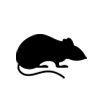This review was commissioned by and originally published in the NZ Herald on 5 September 2020
Pet, the new collection of self-published short stories from Pākehā author Kathryn van Beek, manages to be both charming and brutal. I laughed out loud at the first story, about an emotional support ferret who causes chaos when she gets loose on an aeroplane. But then the ferret dies, crushed by her anxious owner who is undergoing IVF. The darkness and the humour twist around one another. Van Beek does not allow the reader to have one without the other.
Each story is themed around a pet – with accompanying illustration – and I enjoyed guessing how the drawing of the animal at the start would turn up in the narrative. But as I read I began to understand that the real theme underlying these stories was not pets but dead babies.
Pet is dedicated to Wilhelmina Elizabeth Armstrong “who was never born”, and this sense of grieving those who might have been haunts the pukapuka. Van Beek seems determined to explore all the ways in which reproduction and parenting can go painfully wrong: infertility, miscarriage, post-partum psychosis, eerily lifelike dolls, ghost babies, starving babies, murdered babies – even a rogue AI entering the soul of an unborn baby. The babies who survive to be children are still up against it: in “The Nor’wester” three children are living in fear of their abusive father, until one day they lure him gradually deeper out to sea and watch him drown.
Despite this bleakness – or rather, hand in hand with it – Pet is also very funny, employing an unmistakeably Kiwi humour. I was particularly entertained by “Best-Dressed Possum”, set at a school fair that is running a competition in which the corpses of possums are dressed up as celebrities. Local single mother Devon has hers on ice: “Last year had been unseasonably hot.” The entries are hilariously grotesque: “Possum Diana was accessorised with a pearl choker, Jacinda Furrdern sported a set of fake teeth and MAGA had a red tie and a giant hairpiece of teased wool.” Devon has put together a Hugh Hefner dead possum with “two rabbit carcasses, each dressed in lace … Hugh and his Bunnies.” But not everyone is following the rules: “an elderly man [was] holding a stiff cat dressed like a rugby player. ‘Sorry mate,’ said Pete. ‘Beautiful job, but I can’t accept a cat … You can’t be seen to be shooting people’s pets.’ The elderly man tucked the cat under his Swanndri and shuffled off, swearing under his breath.” The climax of the story comes when an interfering middle-class urbanite cops a banoffee pie in the face. It’s a slapstick moment but there’s still a thread of wrongness and loss, as Devon and her kids “of uncertain pedigree” are subtly made to feel unwelcome by their neighbours.
Pet – which is available in print and as a podcast from Otago Access Radio – casts an unflinching but also tender light on the kinds of private griefs that often go unacknowledged. I highly recommend it.

